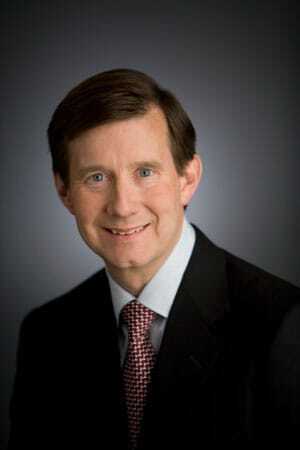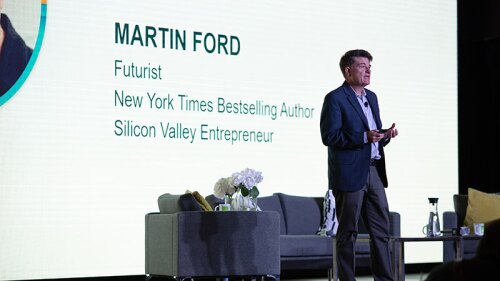W. Edward (Ed) Walter, a renowned real estate industry leader, and most recently the Steers Chair in Real Estate at Georgetown University’s McDonough School of Business, is ULI’s new global chief executive officer. Walter, who joined ULI’s executive team on June 11, was approved for the position by ULI’s Board of Directors on May 1 following a recommendation from a search committee consisting of Thomas W. Toomey, ULI global chairman; Patricia R. “Trish” Healy, ULI Americas chairman; and former ULI global chairs Randall K. Rowe and Lynn Thurber.
Walter brings to ULI more than 35 years of management experience in real estate across a variety of disciplines, including hotels, multifamily housing, and land development, with a strong emphasis on capital markets and investments. From 2007 through 2016, he was chief executive officer, president, and director of Host Hotels and Resorts Inc., where he led a $19 billion–plus global lodging real estate investment trust (REIT) with a high-performing portfolio of more than 110 hotels around the world.
Before becoming Host’s CEO, he was the company’s chief financial officer for more than four years and served in other executive roles at Host for seven years before being named CFO. Walter’s service at Host overlapped with his four-year tenure at Georgetown, where he created and taught the Real Estate Public Equity course, which is designed to explore multiple aspects of REITs.
Toomey highlighted Walter’s grasp of the significance and scope of ULI’s new Global Strategic Plan, which also was approved by the Institute’s Global Board of Directors on May 1. The multiyear plan strives to strengthen member engagement and expand member impact in each of the three regions in which ULI has a presence: the Americas, Europe, and Asia Pacific. As global CEO, Walter will lead implementation of the plan, which includes delivering greater member value through technology investments to improve member connections and involvement with ULI, strengthening and broadening ULI’s member networks, and encouraging more philanthropic giving to expand ULI’s reach.
“Ed is the right leader for ULI. He has a vast set of leadership skills and extensive industry expertise, and he is devoted to guiding ULI’s new course and helping our members make a positive difference in communities around the globe,” said Toomey, who is chairman, CEO and president of UDR Inc. in Highlands Ranch, Colorado. “Ed understands that in this era of great change for our industry and our Institute, it is ULI’s time to flourish.”
Before coming to Host, Walter was an executive for several real estate organizations, including Bailey Capital Corporation in Washington, D.C., where he originated and restructured portfolios of multifamily assets; ZOM Communities in Orlando, where he worked in land development and sales, and multifamily housing development; and Trammell Crow Residential, where he was a partner in a number of developments.
Walter’s industry volunteer leadership experience is equally expansive, including roles at the Real Estate Roundtable (he currently co-chairs the Roundtable’s Research Committee); the National Association of Real Estate Investment Trusts (he chaired the organization from 2012 to 2013); and the American Hotel and Lodging Association, which he helped guide through a strategic planning process while chairing its CEO Council.
He is an active member and current chairman of the Federal City Council, a nonprofit, nonpartisan council of business, professional, education, and civic leaders focused on solutions to urban growth challenges faced by the Washington, D.C., metropolitan region. Walter is also a board member at Avalon Bay Communities and Ameriprise Financial. Previously, he was an active member of the National Kidney Foundation, having served as its board chairman, a national director, and a member of its executive committee. He also served in leadership positions for the foundation’s National Capital Area affiliate organization.
Urban Land recently spoke with Walter about why he entered the real estate profession, what drew him to ULI, the implementation of ULI’s Global Strategic Plan, and ULI’s potential as the leading global real estate organization.
What attracted you to the real estate industry?
After completing my undergraduate studies at Colgate, I chose to attend law school instead of business school, but I always had an interest in the real estate business. When I was studying law at Georgetown, I took every real estate course the university offered. At the time, a good friend of mine was working for a D.C.-based real estate company, and the more I compared what he was doing to the work I was doing as a legal intern, I decided that what he was doing was far more interesting. I finished law school, but then went into real estate and never looked back.
You created and taught a real estate public equity course at Georgetown. Based on that experience, do you think the industry is as appealing to young people now as it was when you started your career?
Interest in real estate as a career ebbs and flows with industry cycles, and it will always be compared to other options. But real estate is always one of the industries that bright young people consider because it is something you can touch—you can see the impact. People know who the major developers are in their market, who the big deal makers are, and they know there is financial opportunity and challenge in real estate.
One factor that may be drawing more people to real estate is that the industry has become more professionalized over the past decades. For instance, nearly 30 REITs are now included in the S&P 500 [Standard & Poor’s stock market index]. These companies did not exist in 1980. Back then, there were a few large companies, but real estate was composed mainly of smaller, local businesses. This evolution toward larger, professional companies has broadened opportunities in that people who would never consider starting out on their own can start with a Fortune 500 company and build a career.
What does increased industry professionalism mean for ULI?
It is good for ULI. As companies get larger, they should be finding it beneficial to be part of organizations that are making a difference. These companies look at ULI as an opportunity for their younger talent—not just the CEO or the C-suite—to network, get exposure, get involved in district councils and product councils, and develop further. When you are running a major company, you should be focused on how you are developing your talent, and ULI can play a big role in that.
What distinguishes ULI from other real estate organizations is that most of them tend to focus primarily on the owners, operators, and financiers, and the most senior executives in those organizations. Our membership is much broader than that, so we can reach much deeper into more companies in terms of including more people involved in different aspects of the industry.
Why were you interested in being ULI’s global CEO at this point in your career?
The timing could not be better. I am at a stage in my career where I am focused more on giving back. I have really enjoyed teaching at Georgetown, helping the next generation learn about real estate, and I loved the opportunity at Host to develop talent there. I also have played an active role in the Federal City Council, which is dedicated to work on challenges faced by D.C. [the District of Columbia]. At ULI, I have the opportunity to work on those issues—creating better cities, solving urban problems, growing industry talent—on a global scale.
And, what makes the opportunity at ULI particularly intriguing is the Global Strategic Plan. I have created and executed strategic plans, and I am well aware of the challenges that go with building consensus around a plan and then executing it successfully. When I define what has made my career exciting and fun, it has to do with these types of major projects.
ULI’s Strategic Plan makes perfect sense. Through the plan, we are looking to engage more members, bring more value to them, and better connect them to each other. Doing this will provide a tremendous opportunity as an organization to increase our impact. Whether we do that through expanding Advisory Services and UrbanPlan, or through our centers and initiatives, all those things tie in well with advancing our mission. If we successfully execute the plan, ULI’s membership development will naturally follow.
What lessons did you take from your career as a leading industry executive that could be applicable to being global CEO at ULI?
Whether it’s a membership organization or a company that is buying, managing, and enhancing the value of properties, what you are doing boils down to figuring out how to work with and motivate a group of people who have the right skills to implement a strategy for success.
Another key element for any successful organization is to appropriately measure what you are accomplishing. With a publicly traded corporation, you will always have a variety of metrics, including your share price. A key element of our Strategic Plan is a call for a better measurement of ULI’s impact—developing the right metrics and meeting or exceeding them will be critical for us to progress as a global organization.
How do you see ULI’s evolution as a global organization?
Clearly, we have to grow aggressively in both Europe and Asia, and the way we do that may be different from how we grow in the Americas. The difference in the membership structure of the national council and district council networks is one example. We have to recognize that what works in one country is not necessarily the same solution for another.
Real estate remains a local business, but just as the world is getting ever more connected, real estate companies are becoming ever more connected. Being the only global real estate membership organization is a huge advantage for us. Our ability to connect members in Asia, Europe, and the Americas sets us apart. We can build our brand and our organization in each of these locales, but it [ULI’s growth] is not just a function of ULI getting stronger in each region. It’s about building relationships that cross continents.
What makes you most hopeful about urban development and city building for the future?
What makes me most optimistic is the fact that we have generally seen a move back to cities—not just younger people, but older people moving into cities because they [cities] are vibrant and safe. If current trends continue, our cities will only get stronger and contribute more to the overall fabric of our communities. Of course, this growth has not come without problems such as insufficient transit and a lack of affordable housing—things that are critical for cities to serve all residents. We can’t have cities just become enclaves for the wealthy and push everybody else out, because cities cannot function that way.
ULI’s great opportunity is to play a leadership role in examining the challenges faced by cities around the world and help create solutions to those problems. That is such a key part of our mission. To the extent that we do that, we will make ULI’s next chapter very rewarding and successful.



